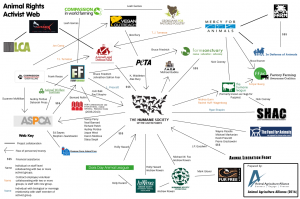As farmers, I think we’ve heard it all. From drenching fields in chemicals to factory farming, there is so much misinformation out there about what happens on today’s farms. Nowadays the average person is six generations removed from farm life — and even in our own backyards, rural communities can be guilty of spreading misinformation.
Yet when you factor in the role that activists play across social media and on television, things get even worse — and so often, groups are operating in cahoots. Think of it, if agriculture is an activist’s enemy, then activist groups naturally bond as friends, or allies.
The money trail behind the food companies and activist groups is shocking, and there are similarities between the anti-GMO movement and the anti-meat (“go vegan”) organizations. While it’s important to not generalize entire groups of people, oftentimes the groups trying to negatively paint anti-animal ag and that are creating messages about “factory farming” have an agenda to get people to stop eating meat.
While the animal-rights group extremists aren’t necessarily selling a product, they’re at least selling an ideology. They’re a passionate bunch of extremists and sometimes will stop at nothing to share misinformation in their campaigns. PETA isn’t exactly broke and is notorious for spreading lies. This video does a really good job exposing some of the awful things they’ve done (and the fraud they’ve committed with animals they’ve killed.)
But it doesn’t stop there. HSUS is nicknamed “PETA with a business suit” and has the same agenda as them except does a ton of lobbying, tries to jack up prices of animal protein (ideally abolish it all together), push farmers out of business and unnecessarily change their practices, etc. HSUS spent over $140 million last year lobbying against animal agriculture alone. Mercy for Animals famously creates videos that are fake, overblown, staged, or taken out of context. If animal abuse occurs that is legitimate, anyone in the right mind would want to stop it. One or two bad apples isn’t representative of the tens of thousands of people involved in the industry. And if these activists really loved animals, why do they continue to let the cameras roll?
The videos are lucrative. Just like anti-GMO campaigns that use fear for profit, “go vegan” extremists also use fear for profit. Sharing sad videos (please help the animals!) is a main way they get donations. Not only that, but another similarity between animal activists and anti-GMO activists is the close-knit ties within the “money trail.” Check it out:

So, you can see, there are similarities.
The money angle to denigrate many of today’s farmers is the same for the anti-GMO side. Many farmers grow crops and livestock, so there is much overlap. “Organic” and “non-GMO” labels are big business — worth nearly $85 billion, and groups frequently use scare tactics to sell. In essence, it’s “buy our products or you’re harming your family.” A lot of what these groups claim also are not true. Here is just one example of the money trail behind the anti-GMO movement:
If farmers were just out there drenching fields and spraying willy-nilly or being harmful to animals, they’d quickly go out of business. Sometimes people forget that there are real faces behind these larger-scale farms and that 99 percent of farms are family owned, according to the most recent USDA data. A bottle of antibiotics in our cattle could set us back $2,000. In a day where commodity prices for crops like corn and soybeans are the lowest they’ve been in decades, farmers cannot afford to spend any more money than absolutely necessary on extra inputs like fertilizers or chemicals. Fortunately a majority of farmers today are using less and safer chemicals than ever before.
With an abundance of affordable food, it can be very easy to take what we have for granted — but it’s so important to really sit down and talk to commercial farmers about what they actually do and why. Myths are easily busted when you go straight to the source: farmers, veterinarians, plant breeders and scientists, etc.
Different activist agendas too often aren’t based in science or firsthand knowledge. Be wary of what you read on the internet from these special interest groups; there are two sides to every story, and the information presented from activists and/or food companies is not usually as it seems.
Michelle Miller, the Farm Babe, is an Iowa-based farmer, public speaker, and writer, who lives and works with her boyfriend on their farm, which consists of row crops, beef cattle, and sheep. She believes education is key in bridging the gap between farmers and consumers.



